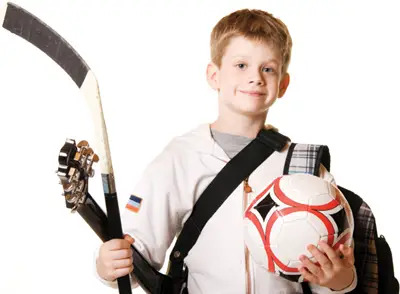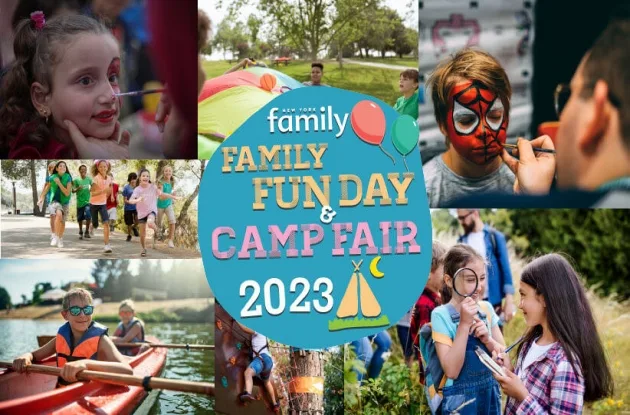From soccer to theater to chess, there’s a specialty camp for every interest. But what happens when you enroll your kids in more than one? Our experts explain how to make the hectic schedule seamless – and how to keep your sanity, too.

“My kids are really active kids who like to be busy,” says Debbie Schwartz of Redding, CT, who will be enrolling her two sons, ages 13 and 10, in multiple specialty camps throughout the summer, as she has done in the past. In addition to the traditional sleepaway camps they’ll be attending, each will also enroll in a combination of two or more specialty camps focused on skateboarding, basketball, all-sports, golf, or nature.
Whether it’s the economy (two parents working and in need of childcare) or parents wanting to give their kids a competitive edge, specialty camp enrollment seems to be on the rise. According to a 2010 survey conducted by the American Camp Association, 34.1 percent of camps said that their most popular session length was one week. Although both resident and day camps were included in the survey, this statistic most likely accounts for specialty camps that tend to have shorter sessions.
Schwartz says that as a result of enrolling her children in multiple camps, they’re more flexible and willing to try new activities, particularly at the traditional camps. “It has been a really positive way for them to spend their summers. They’ve gained enormous skills and great friends, and they’ve gotten to experience a lot of different things and places that they wouldn’t have if we had just limited them to one camp.”
Smooth Switches
Since niche camps are generally intensive, fast-paced, and include a packed schedule of activities, moving on to the next session can be challenging. “The toughest transition is emotional rather than logistical,” explains Dr. Christopher Thurber, a clinical psychologist and author of The Summer Camp Handbook, who says that just as it can be hard as adults to return from vacation only to return to the office, it can be challenging for your kids to adapt. Yet with some planning and open communication, the move from one session to the next can be easy.
Sit down with a calendar that shows your children the months leading up to, during, and after camp so they know what to expect. Whether it’s their first time at a new camp or they’re returning, talk about the camp and find out if they’ll know any of the other campers; they’ll have a clearer picture of what’s in store. “Refreshing your kids’ memories about what exactly the program is about and talking about why you and they decided to sign up for the program in the first place is a really good way to get kids on board,” says Bob Ditter, a child and adolescent therapist who consults with camps throughout the United States and Canada. Ditter says that letting kids help with the packing allows them to take ownership of their camp experiences as well.
The logistical details, like how and when they’ll get to each session, should also be planned ahead of time. “It’s easy to leave things to the last minute, but that puts a stressful cloud on the camp experience. When you’re positive and calm, it sets a really nice tone for an enjoyable camp experience,” says Dr. Thurber. Pre-packing or sending sports equipment or musical instruments ahead of time, for example, although logistical, can also help kids deal with the emotional shift.
Plan a family activity for the time in between camp sessions, even if it’s for just a day – it can be a wonderful opportunity to reconnect as a family. “Other activities can get in the way, and then everyone can feel cheated out of what would be special family time,” says Dr. Thurber.
Make the Most of Momentum
When camp ends (particularly if it’s the session your children enjoyed the most) feelings of disappointment and sadness can surface. “Letdown is natural. When kids get involved in something, they’re bound to make attachments and get caught up in the moment,” says Ditter, who adds that it’s important to talk with your children about what they’ve learned and about the friends they’ve made.Encouraging them to maintain the friendships they’ve made can also help, and with texting, email, and social networking, it’s easier than ever. Many camps also have newsletters, a yearbook or directory, and online bulletin boards. If your children miss the activities, you can look for other opportunities for them to participate later in the summer or during the school year.
Attending a variety of camps can also make it difficult for your camper to be completely immersed and make the most out of each one. Visit the camp’s website, go to an open house, and learn as much as you can about what the average skill level and experience of the campers is and what will be expected of them. “The social adjustment is going to be much more difficult if there’s a mismatch,” says Dr. Thurber.
Remind your children of their strengths, whether they’re talented at dance or great at making friends. “When kids feel reassured about what their strengths are, and that they’re going to be able to call on those strengths when they go to a program, they feel ‘I can handle this,'” Ditter explains.
Time for Zen
Between driving from one camp to the next, packing and unpacking, and juggling the long list of to-do’s, finding time for yourself can be tough. You can be sure you’re not overcommitting yourself or your family if you schedule obligations first and then fit in the other activities you would like to do later. “It’s a great stress reliever to occasionally say ‘no’ to an optional commitment,” advises Dr. Thurber. He reiterates that it’s okay to decline an invitation if it would otherwise make your family’s schedule too hectic.
Scheduling some “me-time” can also ensure you don’t burn out. “The best thing you can do for your child is to have your own life. If you don’t have places where you’re seeing your friends, or getting your batteries recharged, kids see that,” says Ditter. So plan things to look forward to – a date night with your partner, a girl’s night out, or even a half hour to read or call a friend. It can make all the difference between stressed out and serenity.
Also see: Our Camp Guide to the New York metro area



















